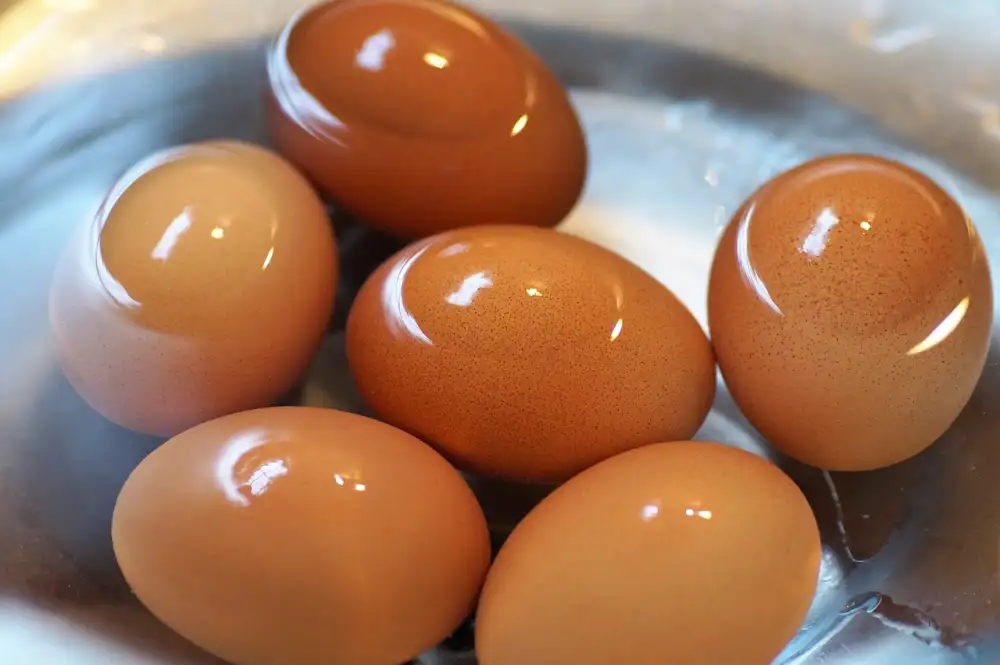Perfecting the Art of Hard Boiled Eggs: A Foolproof Recipe for Delightful Results

Hard boiled eggs are a versatile and nutritious food that can be enjoyed in various ways. They are a popular choice for breakfast, snacks, and even as an ingredient in salads or sandwiches. The process of boiling eggs until the yolk and white are fully cooked creates a firm yet tender texture that is satisfying to bite into. Hard boiled eggs are not only delicious but also easy to prepare, making them a staple in many kitchens around the world. Whether you're a novice cook or an experienced chef, mastering the art of making perfect hard boiled eggs is essential for adding variety and flavor to your meals. In this article, we will explore the benefits of cooking hard boiled eggs, provide a foolproof recipe for delightful results, share tips for achieving perfection, suggest variations and serving ideas, and discuss their nutritional value. So let's dive in and discover the secrets to creating the perfect hard boiled egg!
Benefits of cooking hard boiled eggs
Hard boiled eggs are not only delicious, but they also offer numerous health benefits. Firstly, they are a great source of high-quality protein, which is essential for muscle growth and repair. In fact, one large hard boiled egg contains around 6 grams of protein.
Additionally, hard boiled eggs are packed with important vitamins and minerals. They are particularly rich in vitamin B12, which is crucial for maintaining healthy nerve cells and producing DNA. Hard boiled eggs also provide significant amounts of vitamin A, vitamin D, iron, and selenium.
Another benefit of cooking hard boiled eggs is that they are low in calories. One large egg contains only about 78 calories, making it a healthy snack option for those watching their weight.
Furthermore, hard boiled eggs can be easily stored and taken on-the-go. They can be prepared in advance and refrigerated for up to one week without losing their nutritional value. This makes them a convenient choice for busy individuals or as a quick post-workout snack.
In summary, the benefits of cooking hard boiled eggs include their high protein content, abundance of vitamins and minerals, low calorie count, and convenience. By incorporating these nutritious eggs into your diet, you can enjoy their delicious taste while reaping the many health advantages they offer.
Step-by-step guide on how to make hard boiled eggs
1. Place the desired number of eggs in a single layer in a saucepan or pot.
2. Add enough cold water to the pot to cover the eggs by about an inch.
3. Place the pot on the stove over medium-high heat and bring the water to a boil.
4. Once the water reaches a rolling boil, reduce the heat to low and let it simmer for about 9-12 minutes.
5. While the eggs are simmering, prepare an ice bath by filling a large bowl with cold water and ice cubes.
6. Once the cooking time is up, carefully transfer the eggs from the pot using a slotted spoon and place them into the ice bath.
7. Let the eggs sit in the ice bath for at least 5 minutes to cool down and stop further cooking.
8. Gently tap each egg on a hard surface to crack its shell, then peel off the shell under running water if needed.
9. Your perfectly cooked hard boiled eggs are now ready to be enjoyed or used in various recipes.
By following these simple steps, you can achieve consistently delicious hard boiled eggs every time!
Tips for perfect hard boiled eggs
1. Start with room temperature eggs: Allow your eggs to sit at room temperature for about 30 minutes before cooking. This helps to prevent cracking and ensures even cooking.
2. Use a gentle boiling method: Place the eggs in a single layer in a saucepan and cover them with cold water. Slowly bring the water to a gentle boil over medium heat. Rapid boiling can cause the eggs to bounce around and crack.
3. Cook for the right amount of time: For perfectly cooked hard boiled eggs, let them simmer in the gently boiling water for about 9-12 minutes, depending on their size. This will result in firm whites and creamy yolks.
4. Cool rapidly: After cooking, immediately transfer the eggs to an ice bath or run them under cold water to stop the cooking process. This helps to prevent overcooking and makes peeling easier.
5. Peel with care: To make peeling easier, gently tap each egg on a hard surface to crack the shell, then roll it between your hands to loosen it further. Start peeling from the wider end where there is an air pocket.
6. Freshness matters: While fresh eggs are delicious, they can be difficult to peel. If you're planning to make hard boiled eggs, it's best to use slightly older ones (about 7-10 days old) as they tend to peel more easily.
By following these tips, you'll be able to achieve perfectly cooked hard boiled eggs every time – with firm yet tender whites and luscious golden yolks that are sure to delight your taste buds!
Variations and serving suggestions for hard boiled eggs
Hard boiled eggs are incredibly versatile and can be enjoyed in various ways. Here are some delicious variations and serving suggestions to elevate your hard boiled egg experience:
1. Deviled Eggs: Cut the hard boiled eggs in half lengthwise, remove the yolks, and mix them with mayonnaise, mustard, salt, pepper, and any other desired seasonings. Spoon or pipe the mixture back into the egg whites for a tasty appetizer or snack.
2. Egg Salad: Chop the hard boiled eggs and combine them with mayonnaise, chopped celery, onions, mustard, salt, and pepper. Use this flavorful mixture as a filling for sandwiches or wraps.
3. Cobb Salad: Slice hard boiled eggs and use them as a topping for a classic Cobb salad along with bacon bits, avocado slices, cherry tomatoes, crumbled blue cheese, and lettuce.
4. Scotch Eggs: Wrap hard boiled eggs with seasoned sausage meat, coat them in breadcrumbs, and deep fry until golden brown. Serve these crispy delights as an appetizer or enjoy them with a side of salad.
5. Pickled Eggs: Place peeled hard boiled eggs in a jar filled with vinegar brine (made from vinegar, water, sugar, salt, and spices) and let them marinate for several days to develop tangy flavors. These make a great addition to charcuterie boards or as a snack on their own.
6. Egg Curry: Add sliced hard boiled eggs to a flavorful curry sauce made with spices like turmeric, cumin, coriander, ginger, garlic, onions, tomatoes, coconut milk or yogurt. Serve this aromatic dish over rice or with bread.
7. Nicoise Salad: Arrange sliced hard boiled eggs on top of mixed greens along with cooked green beans or asparagus spears, olives (preferably Kalamata), cherry tomatoes,
tuna chunks (optional), and a drizzle of vinaigrette for a refreshing and satisfying salad.
These are just a few examples of how you can enjoy hard boiled eggs. Feel free to experiment with your own combinations and flavors to suit your taste preferences. Hard boiled eggs are not only nutritious but also incredibly versatile, making them a staple in any kitchen.
Nutritional value of hard boiled eggs
Hard boiled eggs are not only delicious, but they also pack a nutritional punch. They are a great source of high-quality protein, containing all the essential amino acids needed for optimal health. In fact, one large hard boiled egg contains about 6 grams of protein.
Eggs are also rich in vitamins and minerals. They are an excellent source of vitamin B12, which is essential for brain function and the production of red blood cells. Additionally, hard boiled eggs contain vitamins A, D, E, and K, as well as various B vitamins such as riboflavin and folate.
Mineral-wise, hard boiled eggs are a good source of selenium, which acts as an antioxidant and supports thyroid function. They also provide iron for healthy blood cells and zinc for immune system support.
Furthermore, hard boiled eggs are low in calories and carbohydrates while being high in healthy fats. This makes them a satiating food choice that can help with weight management.
It's important to note that most of the nutrients in eggs are found in the yolk. While the yolk does contain cholesterol, research has shown that dietary cholesterol has minimal impact on blood cholesterol levels for most people.
In conclusion, hard boiled eggs offer a wide range of essential nutrients including protein, vitamins (especially B12), minerals like selenium and iron, and healthy fats. Incorporating them into your diet can contribute to overall health and well-being.
In conclusion, hard boiled eggs are a versatile and nutritious addition to any meal. They are easy to make and offer numerous benefits. From being a convenient snack option to a key ingredient in various recipes, hard boiled eggs provide a good source of protein, vitamins, and minerals. By following the step-by-step guide and incorporating the tips mentioned, you can achieve perfect results every time. Experiment with different variations and serving suggestions to add variety to your meals. Whether enjoyed on their own or used in salads, sandwiches, or as a topping for avocado toast, hard boiled eggs are sure to delight your taste buds. So go ahead and master the art of making hard boiled eggs - it's an essential skill for any aspiring chef!
Published: 07. 03. 2024
Category: Recipes



